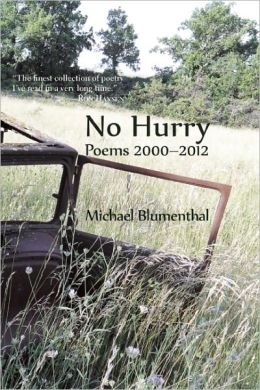Poetry Review: “No Hurry” — Aging Well, In Various Ways
No Hurry is a book about aging: the conscious pang of the loss of past intensities, the treasuring of the quieter now, the achingly slow death of sex.
No Hurry: Poems 2000-2012 by Michael Blumenthal. Etruscan Press. 100 pages, paperback. $16.
By Maryann Corbett
One of the delights of reviewing poetry is researching for a current book and finding that the poet has a long history of work that the reviewer has somehow missed and that she might still pleasurably discover—that, really, she has a duty to discover in order to do justice to the assignment. I have found that delight in Michael Blumenthal, as I’ve read his newest book and sampled work from his seven previous collections of poems. There is a novel (Weinstock Among The Dying) as well, and books of essays, translations, a memoir: a 40-year writing career of work. That I missed all this suggests that the man has never received the press he deserves, in spite of the praise of Howard Nemerov for his first book and Helen Vendler for his second. Yet the poems from his recent collections have been showing up in popular venues like Poetry Daily and The Writer’s Almanac with some regularity. His “Wishful Thinking,” anthologized by Vendler, is reproduced on more than one young person’s Tumblr page. His poems have left their mark.
These newly collected poems will too, though they may leave them on different readers. No Hurry is a book about aging: the conscious pang of the loss of past intensities, the treasuring of the quieter now, the achingly slow death of sex. The arc of the book is downward, from the dive into desperate S&M of “Atelier Rheingold” to the open-palmed detachment of “God’s Window.” Because every poet will age, poets especially will be curious about how this poet tackles the problem David Yezzi described in a review of an earlier Blumenthal book: “Extra care must be taken that the poems don’t adopt the torpor they describe.”
An excellent avoider of torpor is the laugh, and the wry smile does a good job, too. Blumenthal has a good store of effective comic moves, like the splat into bathos of the poem that carries the title
I think constantly of those who were truly great
which evokes Stephen Spender, and then the first line
and to be perfectly honest, it bums me out
Another such move is the opening of “Self-Help”:
It was, as it always has been, a choice
between Twelve Steps to a Compassionate Life
and The Story of O, so I picked up The Story of O
Yet another favorite tack, and not always for comedy, is the long sentence that rolls out its epic catalog of quotidian (a word the poet likes) specifics—
The sweet, considerate lover who betrayed you later,
the loving, devoted wife who ran off with your money
and children, the magnificent accountant
who got you the biggest refund of your life, and
shortly thereafter, was arrested for embezzlement,
all of them were wonderful once, weren’t they?. . .
—and builds gradually to its little climax of wisdom, “if loving me is what you insist on/take the whole package for what it is/wonderful when it is wonderful. . . .”
And sometimes the epic catalog is not quotidian in the least, as in “Lilac Nostalgia,” a paean to the pleasures of food, which contemplates French president François Mitterand’s last meal of oysters, fois gras, and capon and luxuriates in the delicate work of constructing the dessert of the title.
But the poems that rise out of the mass of specifics and then go onto dare abstractions are the ones in which the unstoppable pour of the language becomes truly charged. This happens in “And the Fish Swim in the Lake, And Do Not Even Own Clothing” although excerpting from the long pour is difficult:
. . . the brown headed gulls, the clacking storks
nested two to a village, and the stinging underwater nettles, they too
are benedicted by the elements of water, they too are blessed
though there is no one more sacred than myself here to bless them
It happens too in “Epithalamium: The Leaves”:
The leaves, in their infinite kindness,
take the light from the air and make it
life. So here, in the sometimes dark,
a hand can be met, a mouth, the fragile
kernels of tenderness we call love
can be scattered over the immaculate hills
until believed. That, too, is kindness.
The importance of the abstract to the effect of these poems will stand out to readers who know the standard arguments about poetic craft. And clearly Blumenthal knows those arguments too, and he counters in the poem “Abstractions”:
. . . Love justice truthfulness hurt,
I say to my workshoppy friends,
in how many ways
would you like me to fill them?
And when I am done with those,
how many specific facts will you
still need, in what shape and size,
and for whose embarrassingly factual sake?
My one slight disappointment is with Blumenthal’s use of form, which is nearly nonexistent apart from his six villanelles. In a book of 63 poems, a nearly 10-percent villanelle ratio is noticeable and prompts one to ask, Why so much of this and so little other rhyme or form, barring the ”Existential Couplets” and the “Six Cheerful Couplets on Death”? True, the villanelle is various and contains multitudes. But it attracts attention, and not all of these poems stand up equally well under the spotlight. Invoking Elizabeth Bishop on purpose, as Blumenthal does in “Two Arts,” risks the question, Is this poem as good as hers? (And invoking Larkin’s “Aubade” in the “Six Couplets” does, too.) And Blumenthal seems to like to ally form with slightness, another risk, though a book this dark overall needs a few puffs of cumulus.
Still, in a few of the villanelles, formal straitness upholds genuine heft. “The Germans” distills a whole people’s high, sad history and ends
Proud of their Schiller, and proud of their Hegel,
Of Rilke too, and of Goethe still prouder,
So punctual, decent, historically regal.
And what are they reading? The Tagesspiegel.
And one that gives me a real pang is “Two Short”:
They’ll never be, those other two
That love had made, but life denied,
That could have been, of me and you.
All these poems are as different as they are in part because, as Blumenthal explains in an author’s note, they were written over a period of 15 years. So which of the poems present “a person who, while I do not wish to disavow his existence, I (gratefully) no longer entirely am”? There is plenty here to pique a reader’s curiosity and to prompt the rereadings that might answer such questions, and there is plenty in No Hurry that displays the power Michael Blumenthal’s work has had from the beginning.


